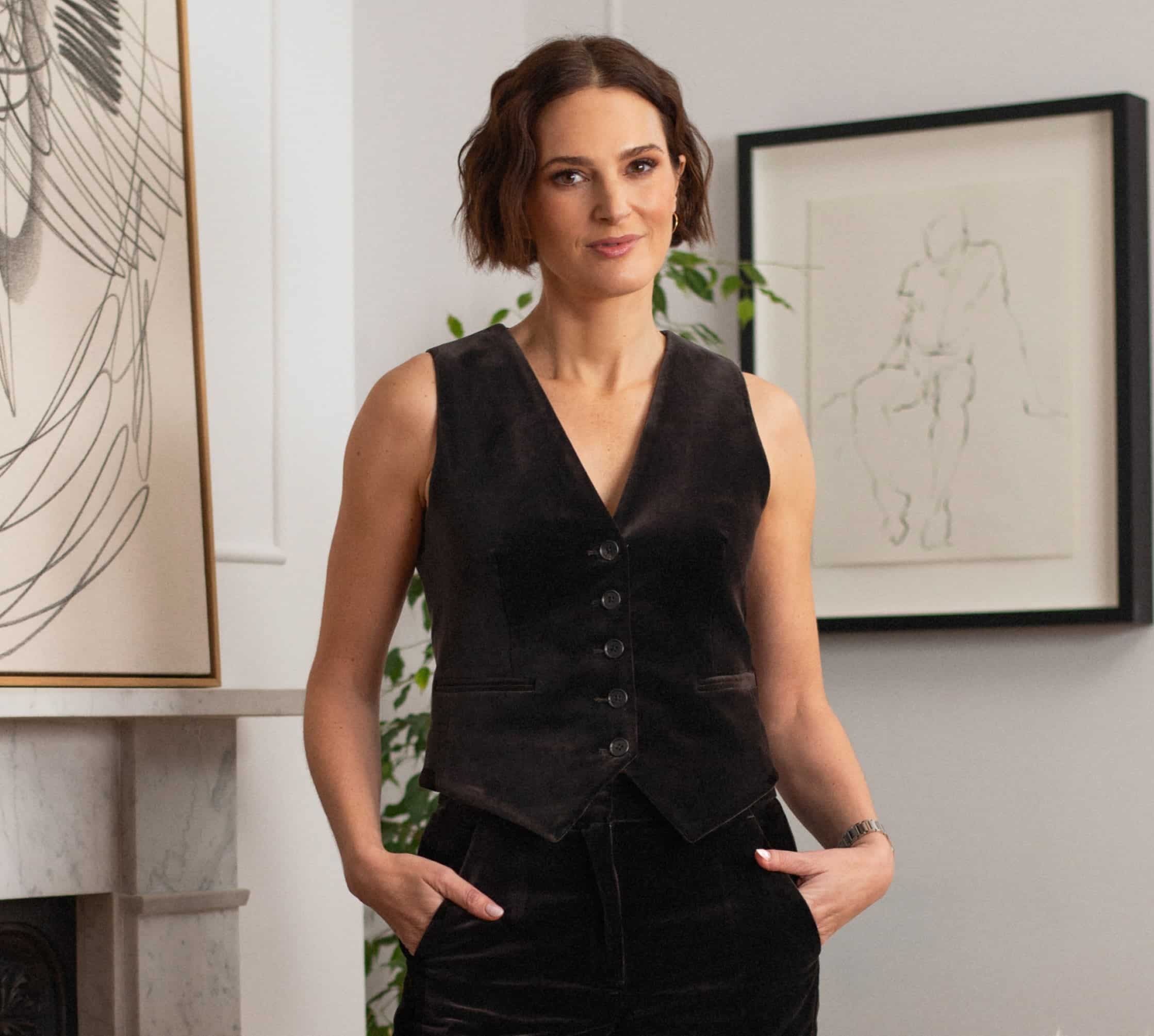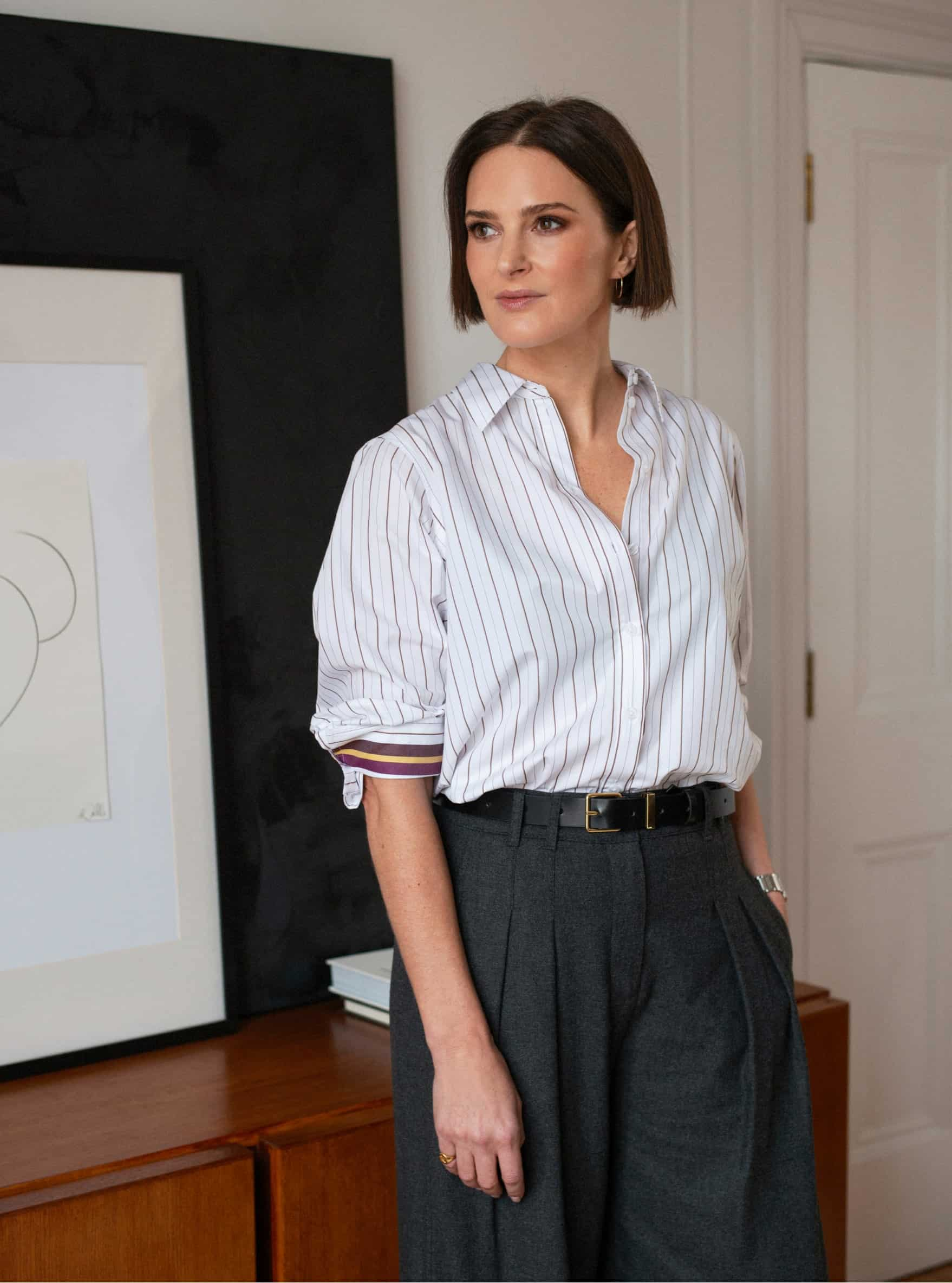Velvet Tailored Vest
Double Espresso
Shipping from $15
Duties and Taxes paid

That something all about failure should turn out to be such a huge success may seem ironic, but it certainly isn’t surprising. For what author and broadcaster Elizabeth Day did when she launched her now hugely popular podcast, How To Fail, was to give people - particularly women - the license to reframe traditional notions of success and failure. Alongside guests that range from Kate Winslet to Salman Rushdie, Day has taught us how to talk about life’s troughs not with any hint of shame, but with acuity, kindness and plenty of good humour.
It’s precisely why, ahead of her in-store Q+A with ME+EM Founder Clare Hornby, we had to take our opportunity to mine Day for all the pearls of wisdom she could spare.

Has your definition of success changed since you started How To Fail?
I used to have quite conventional notions of success and attached it to job success, or how much money might be in your bank account, or the idea of having status. Doing How To Fail has made me realize that, however successful someone might seem on the surface, every single one of those people actually has failure in their backstory, and as well as being a story of success, it’s also about the challenges that they overcame to get where they are.
That's made me realize that for me, success is about authenticity. It's about having been able to get to know myself and the way you get to know yourself, I believe, is through having the courage to be vulnerable. How To Fail has been a great gift for me because it has given me a space where I can show up as my vulnerable self and be accepted for that. That, for me, is the truest version of success: confidence.
Have you had a favorite fail from one of your guests?
Bernie Sanders saying that he failed to get into his high school basketball team. I think the reason I loved that one was twofold. One, I could not believe that I had got Bernie Sanders on How To Fail, and that he had appeared in person in this tiny broom cupboard that I used to record in.
The second reason why it stayed with me is because here is this man who is so eminent, successful in so many ways, who seems to have so many of the answers to the dysfunction of society, and yet he is still haunted by the fact that he didn't make his high school basketball team when he was 15. There's something so potent about that, about how our childhood might shape us and how we might spend the rest of our lives trying to compensate for this adolescent rejection.

If I'm allowed to be greedy and have a second: Andrew Scott, the actor who famously played the Hot Priest in Fleabag. We got into a really interesting conversation about the language that we use around sexuality, the language around ‘coming out’ or being ‘openly gay’, both of which are very diminishing phrases. Those are two that stick most in my mind.
“For me, is the truest version of success is confidence”
Which of your guests has given the best advice?
I've got a little bit of advice that has proven to be a gem in my life from every single guest who's ever come on How To Fail, but the one person who I think has had the most influence on me personally is [entrepreneur and writer] Mo Gawdat.

He has such an extraordinary way of interpreting and communicating complex ideas. The thing that has been most powerful for me is the idea that we are not our most anxious thoughts, and that we can actually train our brains to think more contentedly. He has a very practical way of doing this, which is to call his anxious brain a name, so he calls his Becky. And when Becky is telling him ‘You are a failure as a parent, you can't do this at work, who do you think you are?’ he actually stops himself wherever he is and he says, ‘Becky, I would really like it if you could take away that anxious, negative thought and replace it with a more positive one’. And if you do that enough, you can actually train your anxious brain in that way. It does actually work, I've done it myself.
The other brilliant thing about it is that it introduces a moment of thought before your reaction. So instead of falling into old habits, you can actually have a moment where you analyze how you want to respond to that given situation. He is the one who's given me the best advice, and has continued to over the years so I'm very grateful for his friendship.

How do you dust yourself off after a failure?
If it is one of those common-or-garden failures, like you failed to get a job promotion, which feels really stinging at the time but you can ultimately learn something from it, then I think it's really important to take a moment to mourn the thing that you've lost or that you failed to achieve. Actually take a moment to really understand and process how you're feeling. And once you've had that moment, do something that makes you feel good, whether that is eating a slice of hot buttered toast, having a nice glass of wine, going for a walk in the countryside or just talking to a friend.

And then after that, just remember that all failure is data acquisition. That doesn't mean that the failure itself is easy to overcome or easy to cope with, and it doesn't mean that the failure itself has to have meaning. But in the fullness of time, I really do believe that living alongside it will teach you something meaningful.
“I really do believe that living alongside failure will teach you something meaningful”
Do you have a mantra?
I do have a mantra that I live by and it is taken from a prose poem called Desiderata, written by Max Ehrmann. The line is: ‘the universe is unfolding exactly as it should’. It reminds me that even if something feels like a particular challenge, or if it feels like it's not going the right way, that in the fullness of time I will be grateful for having lived through that challenge. And when I look back on it, I will realize that it has taught me something meaningful.
I have another mantra which is ‘only connect’. It comes from one of my favorite books on the planet, Howard’s End. E.M. Forster uses it about connection within oneself, but I also love it as the idea of connecting with other people. I love the phrase so much that I have it tattooed on my inside wrist.